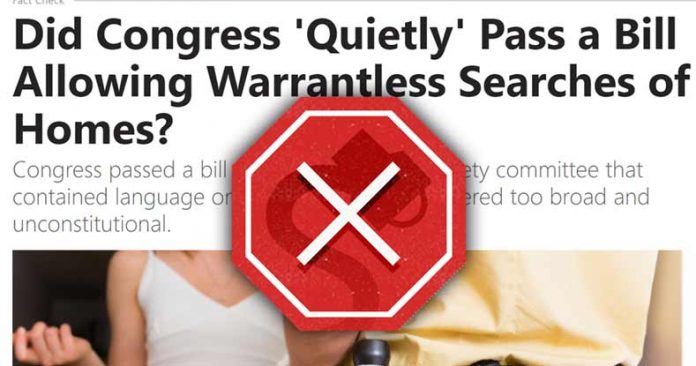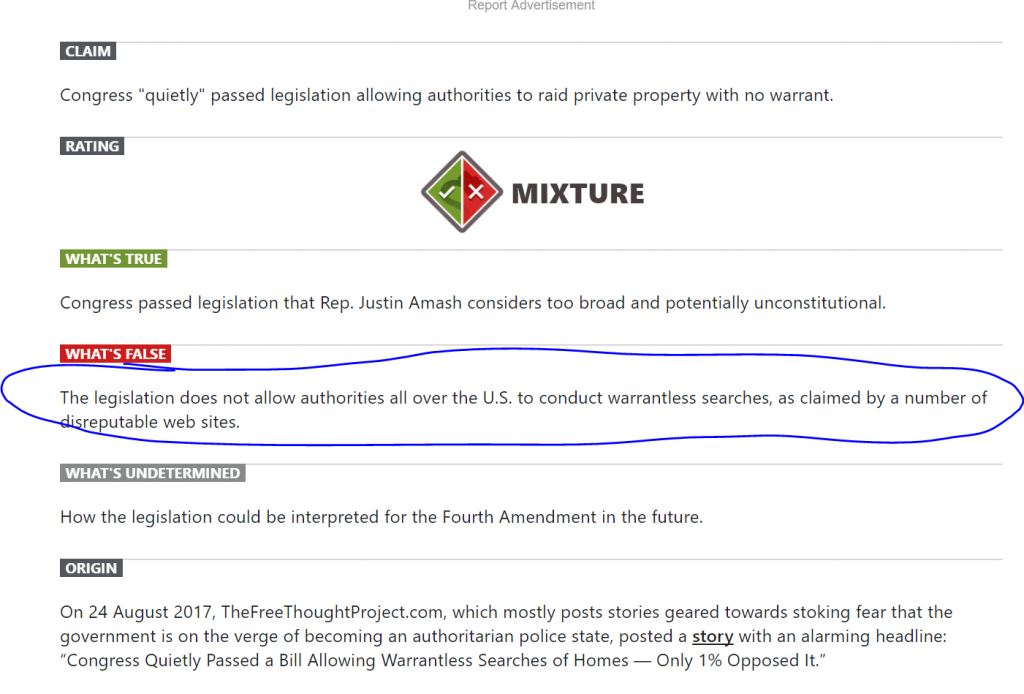
Snopes.com has made its name as the truthful source that debunks crazy conspiracy theories and “fake news” on the internet, but its response to a story on legislation allowing warrantless searches is in need of its own fact check.
As Snopes correctly noted, the story in question was published by The Free Thought Project on Aug. 24, and is on the subject of House Joint Resolution 76. What Snopes does not mention is that up until TFTP reported on the legislation, it received virtually no media coverage, aside from criticism from Congressman Justin Amash on social media.
As the original story noted, House Joint Resolution 76 creates the Washington Metrorail Safety Commission, which looks harmless on the surface. The bill claims that its purpose is “Granting the consent and approval of Congress for the Commonwealth of Virginia, the State of Maryland, and the District of Columbia to enter into a compact relating to the establishment of the Washington Metrorail Safety Commission.”
In its “Fact Check” of the story, Snopes made the claim that “The legislation does not allow authorities all over the U.S. to conduct warrantless searches, as claimed by a number of disreputable web sites.”
This is 100% true. The legislation does not allow this, at all.
However, The Free Thought Project never made that claim. Here’s what our original report noted about how warrantless searches could result from the creation of this safety commission:
The major red flag that comes from this bill can be found in the list of powers that are given to the safety commission, when it comes to its authority over the properties around surround the metro rail system. As the text of the bill notes:
“In performing its duties, the Commission, through its Board or designated employees or agents, may: Enter upon the WMATA Rail System and, upon reasonable notice and a finding by the chief executive officer that a need exists, upon any lands, waters, and premises adjacent to the WMATA Rail System, including, without limitation, property owned or occupied by the federal government, for the purpose of making inspections, investigations, examinations, and testing as the Commission may deem necessary to carry out the purposes of this MSC Compact, and such entry shall not be deemed a trespass.”
The problem with this legislation is that even if the commission gives advanced notice that it will be entering a private property, that advanced notice is not a search warrant. Under the Fourth Amendment, a search warrant can only be obtained with the consent of a judge, and it must have probable cause laid out by law enforcement.
The bill received unanimous approval in the Senate, and Justin Amash was one of just five members who voted against it in the House. As he noted on Twitter, the bill gives the government the authority to enter and search private property in parts of Washington DC, Virginia, and Maryland without a warrant.
Only 5 of us voted against bill allowing govt to enter/search private property in parts of VA, MD & DC w/o warrant. https://t.co/SVhTWqbPaB
— Justin Amash (@justinamash) July 18, 2017
Responding to critics on Twitter, Amash wrote, “This bill does authorize a #4thAmendment violation. Congress has a duty not to pass such broad language even if Constitution nullifies it.”
This bill does authorize a #4thAmendment violation. Congress has a duty not to pass such broad language even if Constitution nullifies it.
— Justin Amash (@justinamash) August 27, 2017
As Amash also noted, the language of the bill is entirely too broad. “‘Safety’ presumably includes preventing criminal/terrorist activities near WMATA. Bill doesn’t contemplate potential abuse of MSC authority,” he wrote.
“Safety” presumably includes preventing criminal/terrorist activities near WMATA. Bill doesn’t contemplate potential abuse of MSC authority.
— Justin Amash (@justinamash) August 27, 2017
When a Twitter user insisted that the bill only applies to “federally owned property,” Amash replied, “Read carefully. It applies to *any* property ‘adjacent to the WMATA Rail System.’ You ignored the phrase ‘including, without limitation.’”
Read carefully. It applies to *any* property “adjacent to the WMATA Rail System.” You ignored the phrase “including, without limitation.”
— Justin Amash (@justinamash) August 30, 2017
While Snopes does acknowledge that Amash considers the legislation to be “too broad and potentially unconstitutional,” its entire article is based on the premise that “The legislation does not allow authorities all over the U.S. to conduct warrantless searches, as claimed by a number of disreputable web sites.”
Although Snopes does not list any of these “disreputable web sites,” the only website it does reference is The Free Thought Project, which it describes as a website that “mostly posts stories geared towards stoking fear that the government is on the verge of becoming an authoritarian police state.”
However, the article Snopes was attempting to debunk was based entirely on the facts surrounding the bill—its text, who voted for and against it, and how it was interpreted by elected officials who were charged with the power of determining whether it becomes law. Never once did the story claim this bill would affect the entire United States, or that it would completely put an end to the Fourth Amendment.
As for Snopes’ definition of TFTP’s reputation, an outlet that “mostly posts stories geared towards stoking fear” sounds a lot like the description of the many mainstream media outlets The Free Thought Project debunks on a regular basis. As for warning that “the government is on the verge of becoming an authoritarian police state,” in many ways that is essentially what the government already is—an authoritarian state that uses violence and intimidation to enforce its laws.
Source Article from http://feedproxy.google.com/~r/blacklistednews/hKxa/~3/GxvgMU-GKWc/M.html
 RSS Feed
RSS Feed















 August 31st, 2017
August 31st, 2017  Awake Goy
Awake Goy  Posted in
Posted in  Tags:
Tags: 













